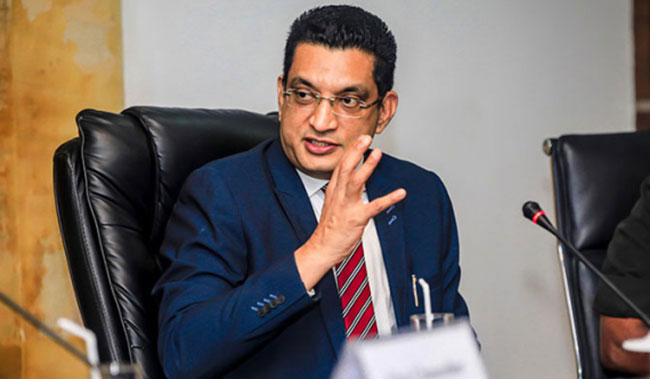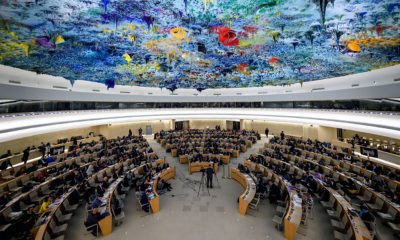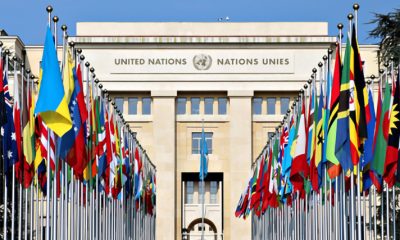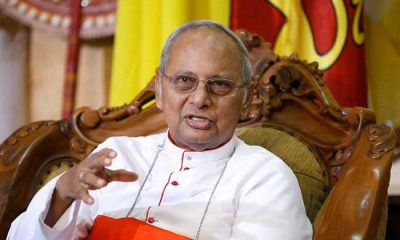News
SL rejects UNHRC resolution

Sri Lanka has categorically rejected resolution A/HRC/51/L.1 (Rev.1), titled “Promoting reconciliation, accountability and human rights in Sri Lanka,” tabled by the United Kingdom, Canada, Germany, Malawi, Montenegro, North Macedonia, and the United States, which was adopted by a vote at the Human Rights Council (HRC) in Geneva, on 06th October.
Minister of Foreign Affairs Ali Sabry delivered the statement, on behalf of Sri Lanka as the country concerned, and called on the Members of the Council to reject the resolution by voting against it.
In support of Sri Lanka’s position, opposing the resolution, the delegation of Pakistan called for a vote. Over half of the members of the Council did not support the resolution with 07 countries (Bolivia, China, Cuba, Eritrea, Pakistan, Uzbekistan and Venezuela) voting against the resolution and 20 countries abstaining on the vote. 20 countries voted in favour of the resolution.Representatives of Pakistan, Brazil, China, Venezuela, Japan and Republic of Korea made statements in support of Sri Lanka prior to the vote.
Pakistan said that they share the concerns of Sri Lanka and other Member States that the resolution is intrusive and this level of scrutiny would not be even acceptable to any sovereign state, including the Core Group. They further observed that the resolution fails to recognize the horrendous acts of terrorism committed by the LTTE and its sponsors, lacks balance, proportionality and consistency. At a critical time, when the people of Sri Lanka expect demonstrations of global solidarity and support to face its economic challenges, which are not entirely of Sri Lanka’s own making, the Core Group chose a path that has the potential to exacerbate the problem, instead of improving the situation.
Brazil noted the need to avoid politicization of the work of the Council and reiterated their position that cooperation of the country concerned is key to the success of this Council’s initiatives. Brazil highlighted the responsibility of the international community to support the country in its recovery, including through international cooperation and assistance.
China appreciated the Government of Sri Lanka’s commitment to promoting and protecting human rights, advancing sustainable socio-economic development, improving living standards, protecting the rights of the vulnerable groups, facilitating national reconciliation and combatting terrorism. China regretted that the resolution is tabled without the consent of the country concerned, is a product of politicization, and will by no means play any positive role in the promotion of human rights in Sri Lanka. China highlighted that the work of the Council should be guided by its founding principles and that all parties should promote genuine dialogue and cooperation and refrain from adopting double standards. China rejected the practice of using human rights as a pretext to interfere in the internal affairs and undermine the sovereignty of other countries to the detriment of international cooperation.
Venezuela expressed their deep concern at initiatives that do not have the support of the country concerned and that the Core Group is insisting on imposing hostile initiative, monitoring and oversight mechanism without the consent of Sri Lanka, ignoring the progress made by the Government. Venezuela highlighted that the mechanism financially bleed out over 6 million dollars that could have been better used to support the least developed countries and further that the practice of wasting money seems all too common in the Council.
Japan recognized the progress made by Sri Lanka and said that the Government’s own initiatives, efforts and commitments are indispensable to achieving real change on the ground.Republic of Korea noted with appreciation the efforts of the Government of Sri Lanka to promote national reconciliation, reconstruction and prosperity.Sri Lanka is grateful to the countries which withstood pressure by the sponsors and demonstrated their support to Sri Lanka by voting against or abstaining on the vote as well as by speaking in support of Sri Lanka.
While delivering the Sri Lanka statement as the country concerned, the Foreign Minister regretted that a draft resolution on Sri Lanka is tabled once again despite the progress made domestically on reconciliation and human rights and Sri Lanka’s continued constructive engagement with the Council. He outlined Sri Lanka’s intention to move forward domestically with replacing the Prevention of Terrorism Act (PTA) with a comprehensive national security legislation, and the introduction of Constitutional amendments and a legal framework to strengthen democratic governance, participation and the rule of law as well as independent institutional oversight. On reconciliation and human rights, Sri Lanka is awaiting the final report of the Presidential Commission and the establishment of a domestic truth-seeking mechanism is under advanced discussion. He also referred to Sri Lanka’s upcoming engagement with the UPR process.
Minister Sabry highlighted that while the resolution may meet the objective of advancing the political considerations of the sponsors, it is manifestly unhelpful to Sri Lanka.The Minister strongly opposed the resolution, particularly the proposal in Operative Paragraph (OP) 8 that seeks to ‘extend and reinforce’ the so-called “external evidence gathering mechanism” created by the Office of the High Commissioner for Human Rights (OHCHR). The mechanism is outside the mandate envisaged for the Council. No sovereign state can accept the superimposition of an external mechanism that runs contrary to its Constitution and which pre-judges the commitment of its domestic legal processes.
The Minister also noted that many countries have already raised serious concerns on the budgetary implications of this resolution given its ever-expanding mandate. He further noted that this is an unhelpful and misdirected drain on the resources of all Member States, including the donors in the midst of ongoing global crises. In sharp contrast, he said that we are faced with the dire financial needs of developing countries to prevent hunger and child malnutrition.
Foreign Minister Sabry objected to the references in the resolution to matters which are outside the framework of the Council such as domestic economic and financial policy. He further observed that solutions to economic and financial crises faced today by many countries will not be found in the mandate, the instruments or the expertise of the Council.
The result of the vote demonstrates that the resolution is another example of the North-South polarization and politicization of the Council, contrary to its founding principles. This vote also demonstrated solidarity among the countries of the South which continued to support the basic founding principles of the Human Rights Council of universality, impartiality, objectivity and non-selectivity leading to constructive international dialogue and cooperation.The Human Rights Council comprises 47 members, including 13 African states, 13 Asia-Pacific states, eight Latin American and Caribbean States, seven Western Europe and Other States, and six Eastern European States.
News
US sports envoys to Lanka to champion youth development

The U.S. Embassy in Colombo welcomed the U.S. Sports Envoys to Sri Lanka, former National Basketball Association (NBA) and Women’s National Basketball Association (WNBA) players Stephen Howard and Astou Ndiaye, from June 8 through 14.
The Public Diplomacy section of the U.S. Embassy said that it would launch a weeklong basketball program intended to harness the unifying power of sports, made possible through collaboration with Foundation of Goodness and IImpact Hoop Lab.
While in Sri Lanka, Howard and Ndiaye, both retired professional basketball players, will conduct a weeklong program, Hoops for Hope: Bridging Borders through Basketball. The Sports Envoys will lead basketball clinics and exhibition matches and engage in leadership sessions in Colombo and Southern Province for youth aged 14-18 from Northern, Uva, Eastern and Western Provinces, offering skills and leadership training both on and off the court. The U.S. Envoys will also share their expertise with the Sri Lanka Basketball Federation, national coaches, and players, furthering the development of basketball in the country. Beyond the clinics, they will collaborate with Sri Lankan schoolchildren to take part in a community service project in the Colombo area.
“We are so proud to welcome Stephen and Astou as our Sports Envoys to Sri Lanka, to build on the strong people-to-people connections between the United States and Sri Lanka,” said U.S. Ambassador Julie Chung. “The lessons that will be shared by our Sports Envoys – communication, teamwork, resilience, inclusion, and conflict resolution – are essential for leadership development, community building, equality, and peace. The U.S. Sports Envoy program is a testament to our belief that sports can be a powerful tool in promoting peace and unity.”
News
Rahuman questions sudden cancellation of leave of CEB employees

SJB Colombo District MP Mujibur Rahuman in parliament demanded to know from the government the reasons for CEB suspending the leave of all its employees until further notice from Thursday.
MP Rahuman said that the CEB has got an acting General Manager anew and the latter yesterday morning issued a circular suspending leave of all CEB employees with immediate effect until further notice.
“We demand that Minister Kanchana Wijesekera should explain this to the House. This circular was issued while this debate on the new Electricity Amendment Bill was pending. There are many who oppose this Bill. The Minister must tell parliament the reason for the urge to cancel the leave of CEB employees,” the MP said.However, Speaker Mahinda Yapa Abeywardena prevented Minister Wijesekera responding to the query and said that the matter raised by MP Rahuman was not relevant.
News
CIPM successfully concludes 8th Annual Symposium

The Chartered Institute of Personnel Management (CIPM) successfully concluded the 8th Annual CIPM Symposium, which took place on 31st May 2024. Themed “Nurturing the Human Element—Redefining HRM in a Rapidly Changing World,” the symposium underscored the pivotal role of human resource management (HRM) in today’s dynamic global landscape. Since its inception in 1959, CIPM has been dedicated to advancing the HR profession through education, professional development, and advocacy, solidifying its position as Sri Lanka’s leading professional body for HRM.
Ken Vijayakumar, the President of the CIPM, graced the occasion as the chief guest. The symposium commenced with the welcome address by the Chairperson, Prof. Arosha Adikaram, followed by the Web Launch of the Symposium Proceedings and Abstract Book by the CIPM President. The event featured distinguished addresses, including a speech by Chief Guest Ken Vijayakumar, President of CIPM, and an address by Guest of Honor Shakthi Ranatunga, Chief Operating Officer of MAS Holdings Pvt. Ltd., Sri Lanka.
The symposium also featured an inspiring keynote address by Prof. Mario Fernando, Professor of Management and Director of the Centre for Cross Cultural Management (CCCM) at the University of Wollongong, Australia.
Vote of Thanks of the inauguration session was delivered by Dr. Dillanjani Weeratunga, Symposium Co-chair.
The symposium served as a comprehensive platform for researchers to present their findings across a wide range of critical topics in HRM. These included Cultural Diversity and Inclusion, Talent Development and Retention, Ethical Leadership and Corporate Social Responsibility, Adapting to Technological Advancements, Mental Health and Well-being at Work, Global Workforce Challenges, Employee Empowerment, and Reskilling and Upskilling.
The plenary session was led by Prof. Wasantha Rajapakse. Certificates were awarded to the best paper presenters during the valedictory session, followed by a vote of thanks delivered by Kamani Perera, Manager of Research and Development.
The annual symposium of CIPM was a truly inclusive event, attracting a diverse audience that spanned undergraduates, graduates, working professionals, research scholars and lecturers. This widespread interest highlights the symposium’s significance in the field of HRM, offering a unique opportunity for everyone to network and learn from scholarly brains.The CIPM International Research Symposium was sponsored by Hambantota International Port, Sri Lanka Institute of Information Technology (SLIIT), E B Creasy & Co. PLC, and Print Xcel Company.
























